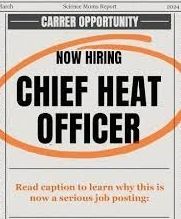Inventing the Future: Overcoming Australia’s Skills Gap in Emerging Sustainability Roles
As new sustainability roles emerge in the fight against climate change, Australia faces the challenge of developing and attracting the talent needed to fill them.

The post-pandemic landscape has brought about a surge in new roles within the renewables and sustainability sectors, many of which didn’t exist just a few years ago. From Chief Heat Officers — with Athens leading the way in Europe appointing their first CHO in 2021 and Melbourne City Council's appointment of two women in 2022 — to Carbon Footprint Analysts and Circular Economy Specialists, these roles are being created to tackle climate change in innovative ways. While this is a positive step forward, it presents a unique challenge for talent acquisition, particularly in Australia, where a shortage of onshore skills has long been a hurdle.
On the positive side, the emergence of these roles signifies that organisations are recognising the need for dedicated experts to solve climate-related problems. For recruiters, this opens the door to exciting opportunities, allowing them to source talent for cutting-edge positions that are shaping the future of sustainable industries. It also drives the need to attract global talent, offering an incentive to build a more diverse workforce.
However, the downside is that Australia faces an uphill battle in filling these roles domestically. The talent pool for specialised positions like Chief Heat Officer or Renewable Energy Integration Manager is limited, largely due to the nation's historical reliance on fossil fuels and lack of investment in onshore training. As a result, recruitment consultants are often forced to look overseas, navigating the complexities of visas, relocation, and potential skills gaps.
In the long term, this shortage underscores the need for a stronger focus on upskilling and reskilling within Australia. Universities and training institutions need to quickly adapt to the growing demand for sustainability expertise, ensuring the country isn’t left scrambling for talent while other nations surge ahead in their climate efforts.
For talent search professionals, the challenge is twofold: find the best global talent while advocating for the development of local expertise. It's a balancing act that, if navigated well, could set Australia on a path to becoming a leader in renewable energy and sustainability—but only if the skills gap is addressed with urgency.
Here are some practical steps organisations and individuals can take to bridge the talent gap in renewables and sustainability:
For Organisations:
- Invest in internal upskilling programs: Identify employees with potential and offer specialised training in sustainability and renewable energy.
- Partner with educational institutions: Collaborate with universities or training providers to develop tailored sustainability-focused programs.
- Launch internships and graduate schemes: Attract new talent directly from educational institutions by offering opportunities focused on sustainability roles.
- Widen the talent pool: Offer flexible work arrangements, such as remote or hybrid roles, to attract global talent without requiring relocation.
- Advocate for faster visa processes: Push for streamlined immigration processes to bring in overseas experts in renewables and sustainability more efficiently.
For Individuals:
- Early specialisation and continuous learning: Take online courses, attend industry conferences, or obtain certifications in areas like renewable energy systems, urban sustainability, or carbon management.
- Network within sustainability circles: Join professional associations, attend webinars, and engage in industry events to stay connected and informed about job opportunities.
- Develop cross-disciplinary skills: Cultivate additional skills like project management, data analysis, and communication, which are valuable in sustainability roles.
- Stay informed on industry trends: Continuously research and stay up-to-date on developments in the field of renewables and sustainability to remain competitive.
By taking these steps, both organisations and individuals can better position themselves to meet the growing demand for sustainability expertise.
Case Study: Medellin's Transformation: From Heat Trap to Greening in Under 3 Years
We know the appointment of such skills to develop and direct these initiatives pays off in significant ways. One such success story is the city of Medellin, Colombia, who have transformed from drowning in pollution to breathing fresh clean air.
Medellín’s Green Corridors project, launched in 2016, has transformed the city’s approach to urban heat management and biodiversity. This $16.3 million initiative involved the planting of 880,000 trees and 2.5 million smaller plants across 30 corridors. The programme, which stretches over 20 km, has already reduced city temperatures by 2°C and aims for a further 4-5°C reduction over the next few decades.
The initiative’s success isn’t just measured by cooling effects. It has significantly improved air quality, with particulate pollution (PM2.5 and PM10) levels falling, and the city’s morbidity rate from respiratory infections dropping from 159.8 to 95.3 per 1,000 people. Additionally, cycling increased by 34.6%, thanks to the creation of shaded bike paths.
Beyond environmental benefits, the programme has had a strong social impact. Over 100 gardeners from disadvantaged backgrounds have been trained to maintain these green spaces, providing both employment and skills. Other cities in Latin America, such as Bogotá and São Paulo, are already replicating the model, illustrating its effectiveness in tackling both climate and social challenges.



